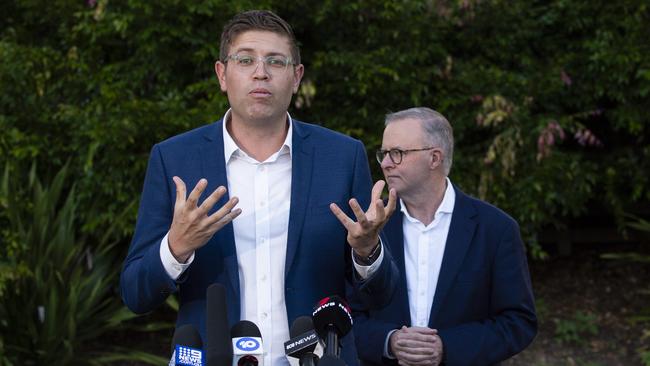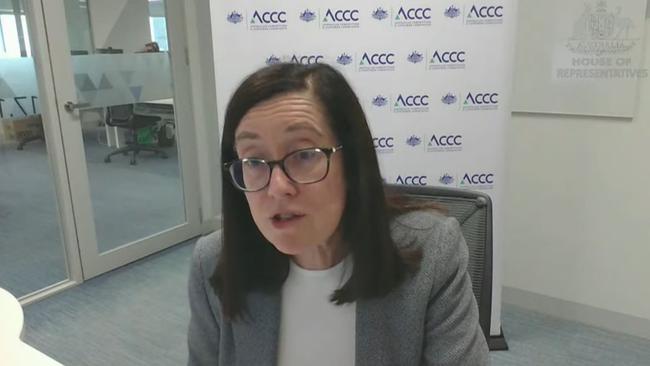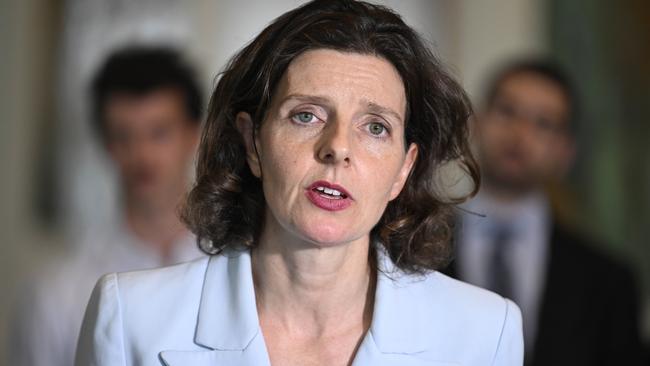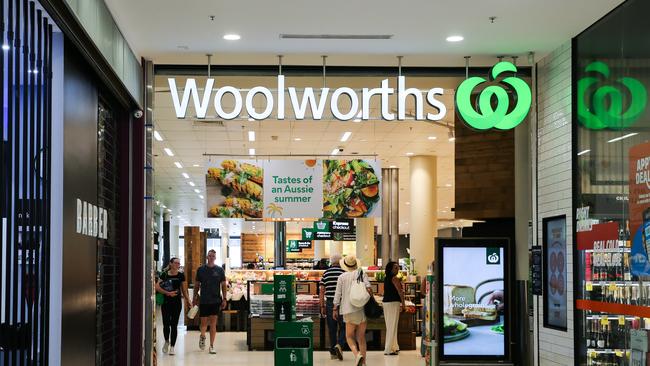ACCC toothless to investigate banks, payment providers overcharging on surcharges
Consumers are regularly paying more than they should to use their own money with a debit card, but current laws render the consumer watchdog useless to investigate.

Costs
Don't miss out on the headlines from Costs. Followed categories will be added to My News.
The consumer watchdog says it can’t to do anything about banks and other payment providers benefiting from excessive debit card payment surcharges.
The ACCC boss Gina Cass-Gottlieb says her agency does not currently have the power to investigate the fact consumers pay above the actual cost of making debit card payments.
Rates up and down the chain vary widely. But a business, for example, may pay about 0.5 per cent to 1 per cent for customer debit payments to be processed by a bank or payment provider.
However, consumers are paying 2.5 per cent because the banks and payment providers lump cash, debit and credit card fees into one “blended costs” fee.
A host of Australian Competition and Consumer Commission executives fronted a parliamentary committee on Friday.

Standing committee on economics member, Labor MP Jerome Laxale, questioned ACCC boss Ms Cass-Gottlieb on consumer surcharges during the hearing.
She told the hearing the obligation to not overcharge on surcharges fell on the merchant, and that “important” law reform on the issue had been stalled because of large legislative backlog.
Mr Laxale pressed the issue.
“If a small business complains about being overcharged for debit (processing), you can’t investigate that?” Mr Laxale said.
“Correct,” Ms Cass-Gottlieb replied.
“Actually we can’t because the obligation to only charge a cost-reflective price … that obligation does not apply to the payment service providers under the law currently,” she said.

The obligation to charge a surcharge truly reflective of the cost for processing the transaction only falls on the merchant, not “other participants in the services chain,” the ACCC chair said.
Ms Cass-Gottlieb pointed to proposed reform of the Payment Systems (Regulation) Act 1998, which will recommend “important” changes to obligations across the payment chain.
Public consultation on these wide-scale reforms ended in mid-2023, and a draft bill was presented for further consultation in November 2023.
NewsWire has contacted the Treasury to clarify what stage this reform is at.

Banks and payment provider companies lump together the various costs of processing cash, debit and credit transactions under flat rates, often above the actual cost of processing the relatively cheap debit payment.
Cards in a digital wallet can attract another varying fee, all of which are passed onto consumers.
The Albanese government wants to ban surcharges, the Reserve Bank is doing an inquiry into the matter, and the big four banks are divided on how to address surcharge reform.
Australians paid one additional surcharge fee, Ms Cass-Gottlieb told the hearing, whereas in the US, UK and Europe, there were more additional charges.
MELTON AND MUDGEE
The competition watchdog says high fuel prices in a NSW town and in a satellite city on the outskirts of Melbourne are not the result of anti-competitive behaviour.
The ACCC was questioned about fuel prices specifically in Mudgee – 250km northwest of Sydney – and Melton – an satellite township on Melbourne’s western edge.
Independent Wentworth MP Allegra Spender said prices at three Mudgee petrol stations – all within walking distance – were consistently higher than in surrounding towns, and numerous complaints were being made to her and her parliamentary colleagues.
Ms Cass-Gottlieb said her agency was aware of the Mudgee situation.
The competition agency analysed other NSW towns which were the same distance away from the ports where fuel was imported, and found no evidence of anti-competitive behaviour.
The ACCC had recently taken action against fuel wholesaler Mobil for alleged conduct in northern Queensland though, Ms Cass-Gottlieb said.

In December, the ACCC filed legal action against Mobil for allegedly selling fuel to six service stations, and contractually requiring signs at the service stations to promote the fuel as higher-grade.
The petrol and diesel did not have the higher-grade additives. Mobil said at the time the issue “occurred as a result of a number of operational difficulties, including unanticipated delays associated with the Covid-19 pandemic and related supply issues, as well as the remote location of the sites involved”.
On Friday, Ms Cass-Gottlieb encouraged consumers to use fuel price apps, as service stations within a short drive of each other could have price differences of 50c a litre.
Labor MP for Hawke, Sam Rae, raised a similar issue for his electorate, specifically in the township of Melton.
While Melton is technically in the Melbourne suburban area, limited public transport leaves the satellite town quite isolated.
Mr Rae said there were demonstrable examples of Melton fuel prices being 80c higher than surrounding suburbs and townships.

“Pricing seems to show collusion between providers,” Mr Rae said.
The ACCC pulled data on Melton prices specifically for Friday’s hearing.
Ms Cass-Gottlieb said Melton prices were close to $2 on average, while the Melbourne average was $1.83.
One Melton station averaged $1.65, but that was on the highway and likely was “responding” to highway competition, she said.
Speaking generally, Ms Cass-Gottlieb said unless there was evidence of information sharing between fuel retailers, there would likely not be enough evidence to issue fines or court action.
The ACCC boss said an investigation into whether Melton fuel prices were an anomaly, was possible.
Last month, the Victorian state government announced impending legislation that would mandate daily price caps and require fuel retailers to declare their prices the following day. The change would put Victoria in-line with the country’s most transparent fuel market in Western Australia.
SUPERMARKETS
Friday’s hearing comes as the ACCC has applied pressure to the big two supermarkets from multiple angles.
A final ACCC supermarket inquiry report is due at the end of February, and in September the agency sued Coles and Woolworths separately over allegedly deceptive sale prices.
Remaining tight-lipped to not prejudice the court action, supermarkets were only discussed briefly at the hearing.
Ms Spender asked about land banking. The interim ACCC supermarket inquiry report identified 165 blocks of undeveloped land being hoarded by the major supermarkets.
The ACCC boss said the final inquiry report was due soon, and any evidence of acquiring land to impede the entry of other competitors into the supermarket industry would be a “competition question”.
“At the council, state and territory level, it is important to open up the development of supermarkets and other industries,” Ms Cass-Gottlieb said.
Reform had allowed Aldi to expand to its current market share, she said.
Originally published as ACCC toothless to investigate banks, payment providers overcharging on surcharges





